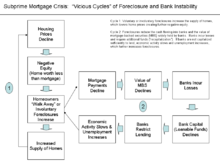Vicious circle (original) (raw)
From Wikipedia, the free encyclopedia
Self-reinforcing sequence of events
Depression expressed as a vicious circle
A vicious circle (or cycle) is a complex chain of events that reinforces itself through a feedback loop, with detrimental results.[1] It is a system with no tendency toward equilibrium (social, economic, ecological, etc.), at least in the short run. Each iteration of the cycle reinforces the previous one, in an example of positive feedback. A vicious circle will continue in the direction of its momentum until an external factor intervenes to break the cycle. A well-known example of a vicious circle in economics is hyperinflation.
When the results are not detrimental but beneficial, the term virtuous cycle is used instead.
Subprime mortgage crisis
[edit]
Vicious cycles in the subprime mortgage crisis
The contemporary subprime mortgage crisis is a complex group of vicious circles, both in its genesis and in its manifold outcomes, most notably the late 2000s recession. A specific example is the circle related to housing. As housing prices decline, more homeowners go "underwater", when the market value of a home drops below that of the mortgage on it. This provides an incentive to walk away from the home, increasing defaults and foreclosures. This, in turn, lowers housing values further from over-supply, reinforcing the cycle.[2]
The foreclosures reduce the cash flowing into banks and the value of mortgage-backed securities (MBS) widely held by banks. Banks incur losses and require additional funds, also called "recapitalization". If banks are not capitalized sufficiently to lend, economic activity slows and unemployment increases, which further increase the number of foreclosures. Economist Nouriel Roubini discussed vicious circles in the housing and financial markets in interviews with Charlie Rose in September and October 2008.[3][4][5]
By involving all stakeholders in managing ecological areas, a virtuous circle can be created where improved ecology encourages the actions that maintain and improve the area.[6]
Other examples include the poverty cycle, sharecropping, and the intensification of drought. In 2021, Austrian Chancellor Alexander Schallenberg described the recurring need for lockdowns in the COVID-19 pandemic as a vicious circle that could only be broken by a legally-required vaccination program.[7]
- Catch-22 (logic) – Situation in which one cannot avoid a problem because of contradictory constraints
- Causal loop diagram – Causal diagram that aids in visualizing how different variables in a system are interrelated
- Chain reaction – Self-amplifying chain of events
- Cycle of poverty – Vicious cycle that reinforces poverty
- Cycle of violence – Violent behavior learned as a child, and then repeated as an adult
- Closed timelike curve – World line of a particle in spacetime which returns to its starting point
- Endogeneity (econometrics) – Concept in econometrics
- Positive feedback – Feedback loop that increases an initial small effect
- Rational addiction – Addiction modeled as economically rational form of consumption
- Reflexivity (sociology) – Circular relationships between cause and effectPages displaying short descriptions of redirect targets
- Self-fulfilling prophecy – Prediction that causes itself to become true
- Spiral of silence – Political science and mass communication theory
- Unintended consequences – Unforeseen outcomes of an action
- ^ Charles Webel, Johan Galtung (19 March 2012). Handbook of Peace and Conflict Studies. Routledge. ISBN 9780203089163. Retrieved 19 March 2012.
- ^ Feldstein, Martin (18 November 2008). "How to Help People Whose Home Values Are Underwater". Opinion. The Wall Street Journal. Retrieved 2013-09-05.
- ^ "Roubini & Panel". Charlie Rose. Retrieved 2013-09-05.
- ^ "Rose & Roubini Discussion". Charlierose.com. Archived from the original on 2013-04-01. Retrieved 2013-09-05.
- ^ "Rose & Roubini". Charlierose.com. Retrieved 2013-09-05.
- ^ Morrison Scott A (March 2016). "Designing virtuous socio-ecological cycles for biodiversity conservation". Biological Conservation. 195. Elsevier: 9–16. doi:10.1016/j.biocon.2015.12.022.
- ^ "Covid: WHO says it is very worried about Europe surge". BBC News. November 20, 2021.
General and cited references
[edit]
- Schlesinger, L.; Heskett, J. (1991). "Breaking the cycle of failure in services". Sloan Management Review. 31: 17–28.
- Rational Choice with Passion:Virtue in a Model of Rational Addiction – In this link the author uses Aristotelian virtue as a mediator between passion and reason in the construction of utility/consumption functions in an esoteric part of consumer behaviour theory related to decision making in addictive situations.
- China: A Stabilizing or Deflationary Influence in East Asia? The Problem of Conflicted Virtue – In this paper the author is using virtue in the sense of a positive outcome (balance of payments surplus) that conflicts with long term regional growth and stability.

